Is Cetaphil Good For Acne? Shocking truth you won’t like!
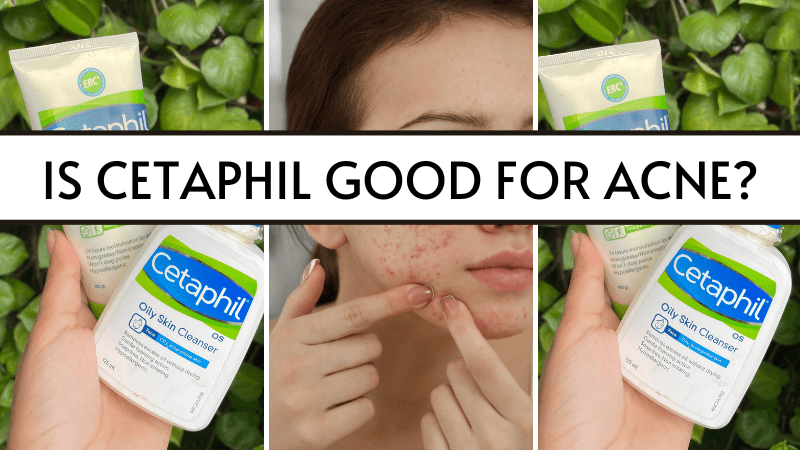
I only recommend products I love and I think you will, too. If you click on links I provide, I may receive a little compensation. Learn more.
If you’re struggling with acne, you’re probably feeling frustrated and desperate for anything that might help clear up your skin after trying a million different products and remedies that were harsh, expensive, and might have worsened the skin. Trust me, I’ve been there. But before you spend your hard-earned money on yet another product that might not work, why not give Cetaphil a try?
Let’s find out if it’s even good for you and made for your concerns.
What is Cetaphil?
Cetaphil is a line of skincare products that are LOVED by dermatologists and ordinary people alike. It includes cleansers, exfoliators, moisturizers, and sunscreen – nothing fancy. The line is marketed as being gentle enough for sensitive skin, which makes it a popular choice for people with acne-prone skin as well.
One of the most popular products in the line is the Daily Facial Cleanser, which is a gentle, soap-free cleanser that can be used both morning and night.
Yes, you know how good it is, but does it work for acne-prone skin? Not specifically, but it doesn’t harm it, either. If you want a short answer, here it is, but if you are looking for a way to fix your acne and build a skincare routine that fights and prevents acne and gives you flawless skin, keep reading the entire article!
Is Cetaphil good for acne?
The short answer is YES. Cetaphil is highly recommended by doctors because it has one of the most gentle formulations, and there are very minimum ingredients, so the chances of them reacting with the skin and making it worse are negligible.
The earlier Cetaphil products were not catered to specific skin concerns, but its newer products are definitely a hit in the market. Its newer range has many ingredients that can help to treat acne, such as benzoyl peroxide and salicylic acid, like this acne face wash. It has worked wonders for my combination, acne-prone skin by gently getting rid of pimples.
However, these ingredients are only present in tiny amounts, so compared to other acne cleansers on the market, it is still a work in progress. But do they work? Absolutely!
In short, Cetaphil is neither the best nor the worse skincare range for acne. It doesn’t have active ingredients that can help treat acne specifically like The Ordinary or CeraVe, but it’s more of a gentle treatment for your skin that nourishes and hydrates it well without chemicals or harsh ingredients and still manages to scuff away acne and other skin issues.
If you wanna fix your acne and get that flawless skin, you always dreamt of, keep reading because I’m telling you, YOU NEED THIS INFO!
What is Acne?
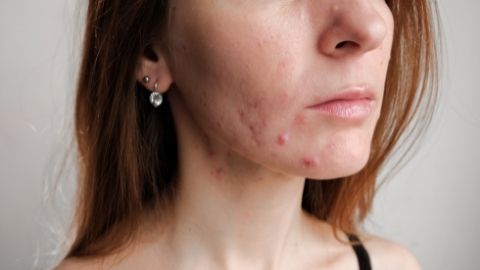
Acne is a common skin condition that can affect people of all ages. There are different types of acne, and the main causes are excess oil production, clogged pores, and bacteria.
Acne can be divided into two main types, inflammatory and non-inflammatory.
Inflammatory acne is characterized by redness, swelling, and pus-filled pimples.
Non-inflammatory acne includes blackheads and whiteheads.
The main cause of acne is excess oil production. When the sebaceous glands produce too much sebum, it can clog the pores and trap bacteria. Hormonal changes, certain medications, and diet can also contribute to excess oil production.
Clogged pores are another common cause of acne. When your pores are clogged, it provides a place for acne-causing bacteria to grow. Not to mention, it can also make your skin look dull and lifeless. The good news is there are a few easy ways to prevent clogged pores. You can check out my blog on an easy acne routine here. I also have a guide to the best products for acne scarring here.
What are the types of acne?
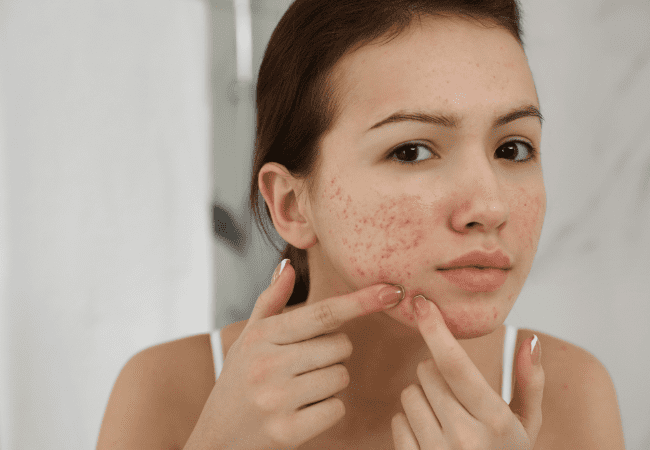
There are all sorts of different types of acne out there, and while they may all seem pretty similar at first glance, each one has its own unique set of causes and symptoms. Here’s a quick rundown of some of the most common types of acne:
Blackheads are small, dark spots that form when dirt and oil clog the pores.
Whiteheads are similar, but they are slightly larger and have a whitehead.
Pimples are larger and more inflamed than black and whiteheads, they can be very painful.
Pustules: Pustules are another common type of acne, and are generally larger and more inflamed than papules.
Papules: Papules are small, red, and often tender to the touch.
Fungal acne: Fungal acne is caused by, you guessed it, fungi! This type of acne is often found on the face, chest, and back, and usually appears as small red bumps.
Nodules: These are large, hard pimples that are deep under the skin. They can be very painful and usually take longer to heal than other types of acne.
Cysts: These are also large pimples, but they are filled with pus. They can be very painful and can leave scars.
Dermatologists rank acne by grades, ranging from 1 to 4 – based on the severity:
- Grade 1 – This grade is considered to be mild. Acne presents mostly as whiteheads or blackheads. A few papules or pustules might be present.
- Grade 2 – This grade is seen as moderate acne, when multiple papules and pustules become present, mostly on your face.
- Grade 3 – This grade of acne is considered moderate to severe or nodulocystic acne. With grade 3 acne pustules and papules are present, along with occasionally inflamed nodules. Your back and chest could also show signs of acne.
- Grade 4 – Graded 4 is the most severe grade of acne where nodulocystic acne is numerous and large. You’ll see many painful and inflamed pustules and nodules present.
Understanding Skin Types
There are a variety of skincare products that are suitable for each type of acne. To understand what skin care products or routine is right for you, it’s good to know what your skin type is and what your main concerns are.
You can have acne and still have dry skin, this is often common with hormonal acne. If this is the case, many of the standard recommended ingredients used to treat acne may not be ideal for you.
Skin Types
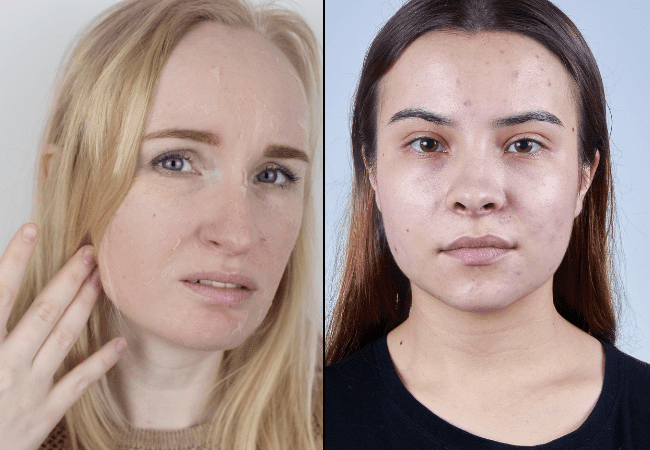
Dry Skin This skin type is often characterized by a feeling of tightness, flakiness, and irritation. If your skin feels dry, it’s probably because it’s not getting enough hydration. The best way to combat dry skin is to use products that are packed with moisture, like hyaluronic acid or glycerin-based products. Avoid products that will strip your skin barrier of oil, as it will leave your skin feeling tighter.
Sensitive Skin is delicate and often reacts to new products, ingredients, or environmental changes. Be extra careful when choosing new products, and always test them on a small patch of skin first. Look for skincare brands like Cetaphil that are fragrance-free and hypoallergenic.
Oily Skin This skin type is often characterized by a feeling of shininess, stickiness, and pimples. If your skin feels oily, it’s probably because it’s producing too much sebum. You will want facial cleansers that provide a deep clean and may want to incorporate double cleansing into your routine.
Combination Skin means you have both oily and dry patches. The key is to find a balance that works for both areas. Avoid products that are too harsh or drying, as they will only aggravate the problem.
Acne-prone skin – Products that contain benzoyl peroxide or salicylic acid are good choices for treating acne. The type of product you use will depend on the severity of your acne.
For mild acne, over-the-counter products may be all you need. For more severe acne, you may need to see a dermatologist and get them to asses your skin to prescribe stronger medication.
What to consider when building a skincare routine for acne
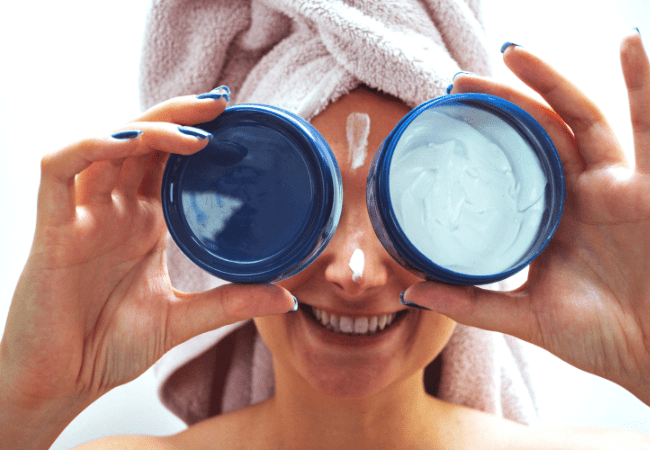
When you’re struggling with acne, the last thing you want to do is add more products to your already over-stimulated skin. But finding the right skincare routine for acne can be a game-changer in your battle against breakouts.
There are a few things to keep in mind when building a skincare routine for acne-prone skin.
- Less is more. You don’t need a 10-step routine to get rid of acne. Using too many products can make your acne worse.
- Make sure you’re using non-comedogenic products. This means that the products won’t clog your pores, which can lead to breakouts. Most of the Cetaphil range is non-comedogenic, which is great.
- Try and use products that won’t irritate or aggravate already inflamed skin. The Cetaphil range was developed for sensitive skin; most of their products won’t aggravate your skin.
When it comes to blemishes, everyone’s skin is different. What works for one person might not work for another. The best way to find out what works for you is by trial and error, but you will want to follow some basic principles.
For starters, it’s important to cleanse your face twice a day. This will help remove any dirt, oil, or makeup that could be clogging your pores. Choosing a gentle cleanser that won’t strip your skin of its natural oils is another essential. Cetaphil cleansers are good for acne-prone skin as they were developed for sensitive skin, so they won’t be harsh on the skin.
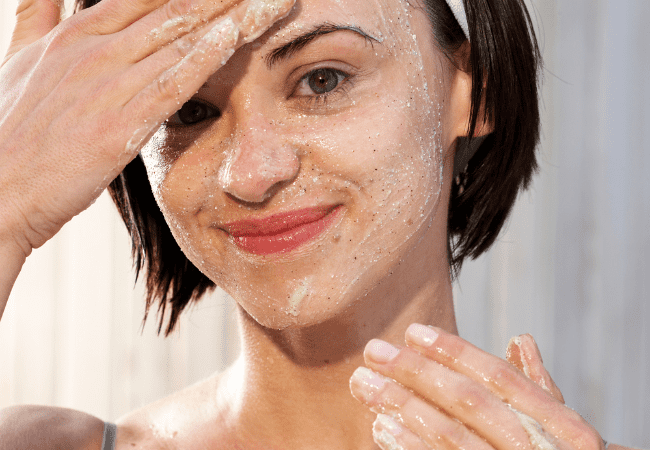
Next, you’ll want to use a light exfoliator at least once a week. This will help slough away dead skin cells, if you have excessively oily skin, you may want to build up to exfoliating two or three times a week. Cetaphil has this daily skin exfoliator perfect for the job.
Essentially, a good skincare routine should clean, treat and then moisturize. It can be as simple as that! The most important part is to find the right products for these steps that suit your skin and skin concerns. If you want more detail on how to build and layer a skincare routine you can see my detailed blog here.
Which Cetaphil Skincare Products are Good for Acne?
So is Cetaphil good for your skin? Well, it depends if the products in the range meet your needs. Look, I LOVE Cetaphil cleansers as they are reasonably priced and work well for my oily, acne-prone skin. If you want to know if Cetaphil will help your acne, I’ve made a quick breakdown below of recommended products based on your skin type and skin concern.
Cleansers
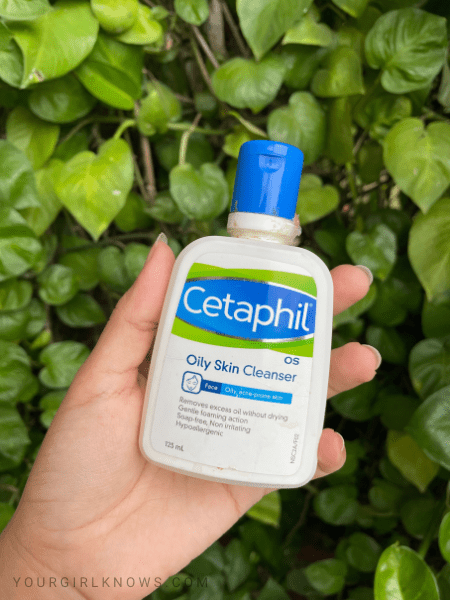
- Dry – Opt for a Cetaphil cleanser that has moisturizing ingredients, like the hydrating foaming cream cleanser. There is also a fragrance-free version. This cleanser has aloe and hydrating glycerin, it’s Cetaphil’s most popular cleanser.
- Oily – One of my go-to products is the gentle clear clarifying acne cream cleanser. It’s gentle on my skin, but the salicylic acid helps to control my oiliness without making my skin dry or tight. Cetaphil also has the dermacontrol oil removing foam wash, which is a deep cleansing face wash with zinc to help balance oil production.
- Combination – If you have combination skin – try the hydrating foaming cream cleanser or the daily facial cleanser, which is formulated to deeply cleanse without stripping the skin of natural oils.
- Sensitive – Cetaphil has a lot of cleansers that are ideal for sensitive skin. If you are suffering from acne-prone skin that’s sensitive, go for a gentle clear clarifying cream cleanser. This product contains Salicylic Acid, which is ideal for acne-prone skin, but also soothing aloe and white tea extract to nourish skin and reduce irritation. Another great option for sensitive skin is the foaming face wash for redness-prone skin. The foaming facewash for redness-prone skin contains allantoin and licorice extract to reduce redness.
Acne treatments
Please, guys, trust me on this. If you have fungal acne or acne that is grade 3 – 4, consult a dermatologist before trying any of the below treatments. A dermatologist can prescribe a personalized skincare routine to treat your concerns and look at the root cause of the acne.
If you are pregnant, also be cautious of the ingredients you use. Don’t use any products that contain retinol, and check with your doctor before beginning a new skincare routine.
Dry – Dry skin with acne can be one of the harder skin concerns to treat. You don’t want to dry out your skin further, but you want to control the breakout and reduce oil build-up. If you have a little bit of hormonal acne I would recommend looking at spot treatment. Try spot treatment on the area where you have acne using gentle clear triple action acne treatment.
Another option can be a light exfoliant like the healthy radiance gentle PHA exfoliating cleanser – just ensure that you aren’t breaking out due to skin barrier issues or over-treatment before using an exfoliator. This exfoliator uses Polyhydroxy Acid (PHA) to remove dry skin and brightens with niacinamide. It’s a brilliant buy if you are struggling with hyperpigmentation and dull skin.
Oily – A good exfoliator will help reduce the build-up of dirt and bacteria and help to speed up the cell turnover process. Cetaphil’s main product to help with acne is the gentle clear triple action acne treatment. This targeted acne serum includes BHA’s to help deeply cleanse the skin. This serum is a light milky gel-like serum that won’t feel heavy or oily.
Combination – I recommend using the purifying clay mask once or twice a week to reduce oiliness and provide an intensive deep cleanse. This mask is great as it’s not too drying, so it’s ideal for combination skin. The product uses Amazonian clay to deeply penetrate the pores and clean them, while apple fruit extract helps deliver hydration.
Sensitive skin – Keep it super simple! Stick to a gentle exfoliator that you can use daily, like the extra gentle daily scrub. If your skin starts to have a big break out, then stop with the daily scrub and try gentle clear triple-action treatment. But don’t use the scrub and the treatment at the same time. If your skin begins to get dry and irritated, you can taper back on the exfoliation; just take note of how your skin is feeling and only do a treatment every 3 or 4 days instead of daily.
Moisturizers
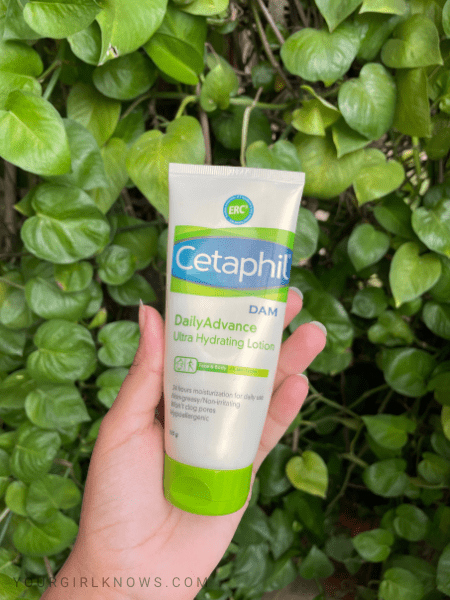
Dry – Get some intense hydration with the Cetaphil deep hydration healthy glow daily cream. This is a lightweight formula that packs a punch. It’s non-comedogenic, so it won’t clog your pores, but the addition of hyaluronic acid and vitamin E will help to moisturize deeply.
Oily – It’s best to use a gel-based moisturizer that’s not too heavy or thick. The deep hydration skin restoring water gel uses polyglutamic acid and Hyaluronic acid to hydrate without leaving a heavy film on your skin.
Combination – Try the Cetaphil daily oil-free hydrating lotion. It’s perfect for combination skin as it’s an oil-free formula but still hydrates for up to 48 hours due to the addition of hyaluronic acid and glycerin.
Sensitive skin – Try the soothing cream gel from Cetaphil to calm redness and irritation with targeted ingredients like aloe and allantoin. Or the redness-relieving night moisturizer is great for the evenings.
So, is Cetaphil good for acne?
Yes, Cetaphil is a great range for acne. Cetaphil is a medicated skincare line that can be as effective as more expensive brands. The formula is oil-free and non-comedogenic and won’t clog pores, so I’ve found it to be a lifesaver for my acne. The best part is it’s affordable!
Let me know if you’ve tried Cetaphil in the comments below. Do you think it’s better than The Ordinary? I’m just obsessed with both of them.
Alternatives to Cetaphil for Acne-Prone Skin
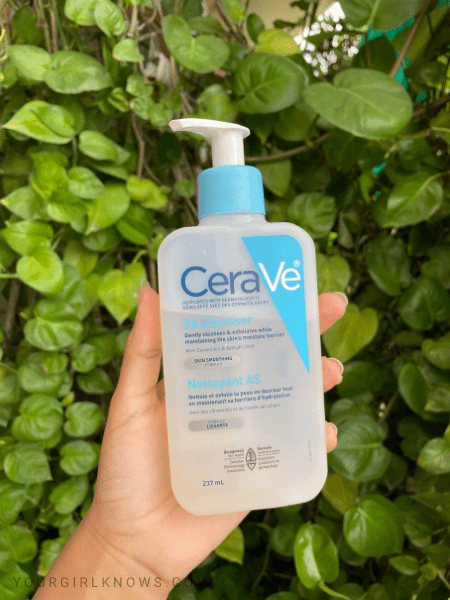
If you’re looking for an alternative to Cetaphil for your acne-prone skin, there are plenty of other options out there. Some other gentle cleansers that may be worth trying are La Roche Posay Effaclar Gel Cleanser and Avene Cleanance Gel Cleanser. Both of these cleansers contain salicylic acid, which can help to unclog pores and prevent future breakouts. In addition, they are both soap-free and suitable for sensitive skin, just like Cetaphil!
Final thoughts on is Cetaphil good for acne and oily skin?
To recap, Cetaphil is good for acne because it is gentle enough not to aggravate existing breakouts while still being effective at removing excess oil and keeping pores clear. So if you’re looking for a new cleanser to add to your skincare routine and you’re struggling with breakouts, give Cetaphil a try—you just might be surprised at how well it works!
Hope you got what you were looking for! I tried to answer everything I could. If you have more questions, drop them below and expect an answer super soon!
Related articles to is Cetaphil good for acne?
- 10 Best The Ordinary Products For Acne Scars That Are Magical
- 13 BEST Drugstore Acne Scar Products That’ll Definitely Help
- How To Get Rid Of Acne Scars: 5 Legit Home Remedies That Actually Work!
- The Lazy Easy Acne Skincare Routine To Change Your Skin

